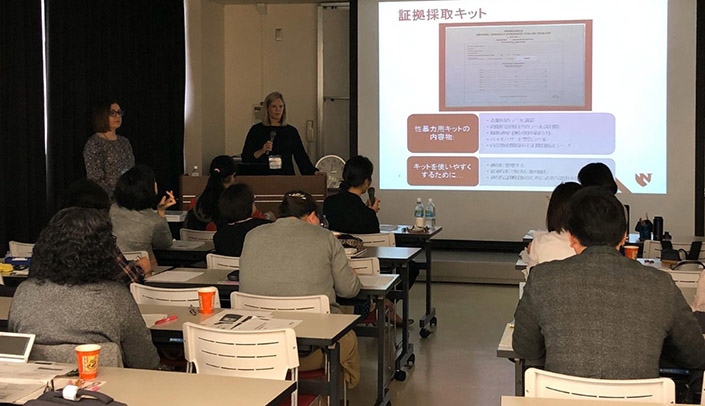Cases may differ, but domestic violence and sexual assault occurs across cultures and on every continent. And regardless of location, there is great value in surrounding trauma patients with the resources they need, whether it’s health care, law enforcement or community advocates.
It is for those reasons that four Nebraska Medicine forensic nurses are sharing their skills and expertise with health care colleagues 5,800 miles away in Akita, Japan.
The registered nurses — Amy Mead, Emilee Wilkinson, Nicole Lenaghan and Kate Buehler — are Sexual Assault Nurse Examiners (SANE) in the Nebraska Medical Center’s emergency department. Each is specially trained to conduct sexual assault evidentiary exams and understand the medical, psychological and forensic examination of a sexual assault patient.
“Being a SANE nurse is about giving power back to someone who has had so much taken away,” said Mead, who earned her bachelor of science in nursing at UNMC. “Our work in Japan was inspiring and felt like the kind of spark that creates a movement.”
In 2015, Japanese laws toward domestic violence and sexual assault changed, Buehler said, to allow for more prosecutions. That change led the International Association of Forensic Nursing to financially support teams in helping educate and train Japanese health care professionals in forensic nursing practices.
“There’s a culture change happening (in Japan),” Buehler said.
And Nebraska Medicine’s nurses are grateful to be part of the change.
“It’s cool to be that closely connected as a change agent,” Buehler said. “We help our patients here, but, there, I felt the potential to have it be on an even greater scale.”
Thanks to a grant from the United States Japan Foundation, the Nebraska team made three trips to Japan in 2019, which enabled them to make connections, educate and train at least 75 health care learners, and determine how best to leverage their available resources for success.
“Sexual assault is not as well reported in Japan,” Wilkinson said. “Our learners expressed how domestic violence or child abuse in the home was just a way of life. They understand now that that’s not OK and want to transform that, but they need extra support and training.”
The group will continue its work in 2020 and help their Japanese colleagues create a patient-centered, nursing curriculum that supports both Japanese law and health care.
The experience also has provided a greater appreciation of the progress that’s been made in Omaha, Wilkinson said. “We’ve really grown our sexual assault team in the emergency department and actively trained more nurses to have coverage on call day and night and work with community advocates and law enforcement,” she said, noting that only five years ago, she and Mead were part of a three-person SANE team at Nebraska Medicine. Today, Buehler leads a team of 14 SANE nurses.
Regardless of culture, stories of sexual assault are often familiar, said Lenaghan, a 2004 College of Nursing graduate. “One learner talked about a patient they treated, and it was like a patient I have had and a story we have all heard. It hit me that domestic violence and sexual assaults happen on every continent and across every culture and there’s so much more to do.”

Congratulations on this great work! In addition, congrats to Thang Nguyen, APRN, who secured the grant to fund this effort. Our nurses are leading the world.
Thank you for your coming to my country and spreading your knowledges and skills for us! You contributed to help doing impacts to circumstances in Japan. I am also encouraged and will continue to struggle for this problem as your colleague.
Hisae Azuma ( RN, SANE in Japan. A participant in this program.)